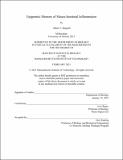Epigenetic Memory of Mouse Intestinal Inflammation
Author(s)
Magnell, Albert T.(Albert Thomas)
Download1251767440-MIT.pdf (5.529Mb)
Other Contributors
Massachusetts Institute of Technology. Department of Biology.
Advisor
Aviv Regev.
Terms of use
Metadata
Show full item recordAbstract
The gut, encompassing one of the largest epithelial surfaces in the body, interacts with both biological and non-biological agents that can cause regular injury. Fortunately, the small intestinal epithelium has a remarkable capacity to repair itself after severe injury, due to the abundance of highly replicative stem cells housed in the intestinal crypt regions. Much remains to be understood about the activation processes of the repair mechanisms and to what extent the stem cells themselves can adapt to certain forms of damage, including molecular mechanisms related to gene regulation. Here, I show that in response to acute inflammation, chromatin in intestinal stem cells has increased accessibility around specific loci and that this state is maintained in some regions even after the epithelium has recovered from damage, suggesting the possibility of memory. Such epigenetic memory may confer some adaptive resiliency to subsequent damage.
Description
Thesis: S.M., Massachusetts Institute of Technology, Department of Biology, 2021 Cataloged from the official PDF version of thesis. Includes bibliographical references (pages 29-31).
Date issued
2021Department
Massachusetts Institute of Technology. Department of BiologyPublisher
Massachusetts Institute of Technology
Keywords
Biology.